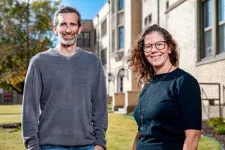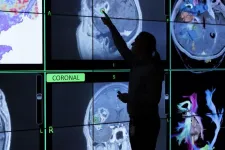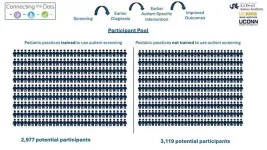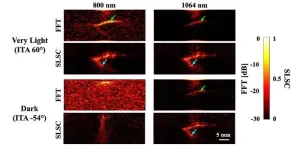(Press-News.org) Hospitals must use artificial intelligence responsibly to avoid huge carbon emissions, new research has shown.
Released before Technology Day (Saturday, 16 November) at the COP29 climate conference in Baku, Azerbaijan, a study investigating the impact of artificial intelligence in healthcare has shown that using large language models to process thousands of patient records daily across multiple hospitals could lead to substantial resource consumption.
Published today (Friday, 15 November) in Internal Medicine Journal, researchers from the University of Adelaide and the University of Reading highlight ways in which hospitals can use AI responsibly - including using shorter prompts to summarise patient data.
Oliver Kleinig, who led the research from the University of Adelaide, said: “Every day you are in hospital, doctors, nurses, and other hospital professionals are documenting pages and pages about your health. By the end of a hospital stay, it is possible to accumulate tens of thousands of words to your name. Unlike busy healthcare staff, private large language models similar to ChatGPT have time to read through and process this information.
“However, with great processing power comes great responsibility. A single AI query uses enough electricity to charge a smartphone 11 times and consumes 20 millilitres of freshwater in Australian data centres. ChatGPT is estimated to use 15 times as much energy as Google.
“Implementing large language models across healthcare could have very significant environmental consequences. Hospital bosses need to think carefully about where and when artificial intelligence should be used in their organisations.”
Questions to consider
ChatGPT's daily carbon emissions already equal that of 400-800 US households. Healthcare AI systems would likely have an even larger footprint, as they require more powerful models to handle complex medical information and must be run locally for patient privacy.
Beyond energy consumption, the hardware needed for these AI systems requires extensive rare earth metal mining, potentially causing habitat destruction. The manufacturing process alone can double the carbon footprint of AI operations.
To reduce the impact of hospitals and medical centres on the environment, the researchers propose five key questions healthcare providers should consider before implementing AI systems, including:
Does my organisation need a large language model? Could existing technology be sufficient?
What LLM should I choose? Use the smallest possible model to decrease resource consumption - smaller, fine-tuned LLMs can outperform larger applications.
How can I optimise my LLM? Use smaller and specific prompts to reduce the carbon impact of applications. Succinct prompts with refined information are more energy efficient.
What hardware should I run my LLM from? Using hardware that runs on renewable energy is preferable.
What data should I share? Maximise LLM efficiency by sharing data where appropriate.
The study suggests AI could potentially reduce healthcare's environmental impact in other ways, such as improving patient flow and reducing paper use.
END
Limit hospital emissions by using short AI prompts - study
2024-11-15
ELSE PRESS RELEASES FROM THIS DATE:
UT Health San Antonio ranks at the top 5% globally among universities for clinical medicine research
2024-11-14
SAN ANTONIO, Nov. 14, 2024 – The race to draw the best and brightest students has become an international one, with candidates weighing options not only in their state or country, but also across the globe. Universities likewise face fierce competition globally for top scientists and research funding.
The University of Texas Health Science Center at San Antonio (UT Health San Antonio) was ranked at the top 5% of universities in the world (No. 51 out of the top 1,000) in the U.S. News & World Report’s 2024-2025 Best Global Universities ...
Fayetteville police positive about partnership with social workers
2024-11-14
In 2021, the University of Arkansas School of Social Work partnered with the Fayetteville Police Department to pair officers with social workers trained to help people suffering mental crises. Initially, the officers were supportive of the effort but also somewhat hesitant. Now that the co-response teams are fully established, the officers say the program benefits the community and helps them carry out their duties.
The officers’ changing attitudes to the program were reported in the latest issue of the Journal of Police and Criminal Psychology. The paper was written by U of A social work professors Mark Plassmeyer and Kim Stauss, who helped launch and continue ...
Optical biosensor rapidly detects monkeypox virus
2024-11-14
A new variant of human mpox has claimed the lives of approximately 5% of people with reported infections in the Democratic Republic of the Congo since 2023, many of them children. Since then, it has spread to several other countries. The World Health Organization declared the outbreak a Public Health Emergency of International Concern on August 14. In addition, a different but rarely fatal mpox variant was responsible for an outbreak that has spread to more than 100 countries since 2022.
There is an urgent need for faster and ...
New drug targets for Alzheimer’s identified from cerebrospinal fluid
2024-11-14
A multitude of genes have been linked to the development of Alzheimer’s disease. Specifically how those genes might influence the progression of neurodegeneration remains something of a black box though, in part because of the challenges of examining in molecular detail the brain of a living patient.
Using cerebrospinal fluid (CSF) collected from living patients, a team of researchers at Washington University School of Medicine in St. Louis has for the first time linked disease-related proteins and genes to identify specific cellular pathways responsible for Alzheimer’s ...
Neuro-oncology experts reveal how to use AI to improve brain cancer diagnosis, monitoring, treatment
2024-11-14
INDIANAPOLIS — An international, multidisciplinary team of leading neuro-oncology researchers and clinicians has released new recommendations for good clinical practice — a set of guidelines that helps ensure clinical trial results are reliable, and patients are protected — regarding the use of artificial intelligence methods to more accurately diagnose, monitor and treat brain cancer patients.
The team recently published two companion policy reviews in The Lancet Oncology, on behalf of the ...
Argonne to explore novel ways to fight cancer and transform vaccine discovery with over $21 million from ARPA-H
2024-11-14
The U.S. Department of Energy’s (DOE) Argonne National Laboratory will use its world-leading capabilities in artificial intelligence (AI) and high performance computing to research novel ways to fight cancer and transform vaccine discovery.
The two awards, totaling up to $21.7 million, are from the Advanced Research Projects Agency for Health (ARPA-H), part of the U.S. Department of Health and Human Services. Established in 2022, ARPA-H’s mission is to accelerate transformative ...
Firefighters exposed to chemicals linked with breast cancer
2024-11-14
It’s well documented that firefighters have significantly higher rates of cancer than the general population, and these elevated rates have been associated with exposures to toxic chemicals on the job. However, most research on cancer in firefighters has been done in men and less is known about the risks in women.
Now a new study by Silent Spring Institute has identified multiple chemical exposures that firefighters face on the job that could increase their risk of developing breast cancer.
“With more and more women entering the profession, it’s important to understand the impact of workplace exposures on their health so that we can inform policies to reduce ...
Addressing the rural mental health crisis via telehealth
2024-11-14
The Medical University of South Carolina has been awarded $1.75 million from the Health Resources and Services Administration to develop and test the effectiveness and sustainability of the SC Rural Telehealth-enabled Collaborative Care Network (SC-RTECC). The SC-RTECC will deliver psychiatric collaborative care management to 1500 primary care patients over a five-year period in seven diverse, rural, underserved South Carolina counties.
The goal of the project is to test whether telehealth can be used to deliver psychiatric collaborative care management efficiently and sustainably at rural primary care clinics in South Carolina.
The project will be led by Ryan ...
Standardized autism screening during pediatric well visits identified more, younger children with high likelihood for autism diagnosis
2024-11-14
New research from Drexel University’s A.J. Drexel Autism Institute found that the use of standardized autism screening during pediatric well-child visits identifies more children with high autism likelihood at a younger age, including those presenting with more subtle symptoms. This is the first large-scale, randomized trial to test the impact of standardized autism screening on early detection of autism in pediatric primary care.
Recently published in the Journal of the American Academy of Child & Adolescent Psychology, the multi-site ...
Researchers shed light on skin tone bias in breast cancer imaging
2024-11-14
Breast cancer is a major health concern worldwide, and early detection is crucial for effective treatment. Traditional imaging methods, such as mammography, have limitations, especially for women with dense breast tissue. Photoacoustic imaging, which combines light and sound to create detailed images of breast tissue, offers a promising alternative. However, recent research has highlighted a significant challenge: skin tone bias.
A team of researchers from Johns Hopkins University recently investigated how skin tone affects the visibility of breast cancer targets in photoacoustic imaging. As reported in Biophotonics Discovery, the study focused on three image ...





